November: course of history changed
The proletarian revolution triumphs in Russia, as nearly the last of the country's armed forces join the Bolshevik party. Together with the working class and peasants, the soldiers make up a powerful core of support.
The Military-Revolutionary Committee, set up by Leon Trotsky to coordinate the November uprising, is branded a criminal organization. But Prime Minister Alexander Kerensky can do little to delay the inevitable with the capital falling to the Bolsheviks practically without a fight. As the Bolsheviks hold closed meetings to coordinate the power seizure scheduled for the night/early morning of the 7th, Kerensky rallies the Junkers – the only forces kept in comparative isolation to Bolshevist propaganda. That proves insufficient; the Bolsheviks already have the use of the Red Guards popular militias. Virtually every gun-bearing individual in uniform is against the regime as well. The government sends the ‘Aurora’ sailors out to sea, and tries to ensure that every other potential unfriendly is out of Petrograd. But ‘Aurora’ disregards the order, on the advice of the MRC. The Junkers are manning every bridge and strategic location in town. But many simply abandon their positions in view of the overwhelming military force and weaponry summoned by the Bolsheviks. The government seat at the Winter Palace never stood a chance.
About two hours before noon on November 7, the MRC issues a public address: "To the citizens of Russia: the provisional government has been deposed..." Institutions – public, governmental and educational – all cease activity by mid-afternoon. Kerensky is nowhere to be seen. By the evening of the 7th, all government structures are under Bolshevik control.
The last pockets of military resistance loyal to Kerensky were crushed outside Petrograd in the days that followed, and a new government – the Council of People's Commissars, loyal to Lenin – takes power.
The Constitution of the Russian Soviet Federative Socialist Republic would later be formalized in 1918.
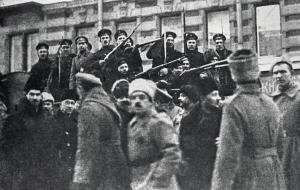
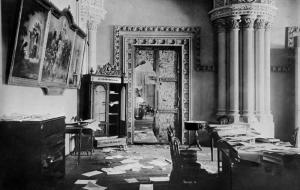
November 2, 1917
An arrest warrant is issued for Vladimir Lenin, as tension permeates the capital. Everyone waits for the Bolsheviks to rise up at any moment, while different information reaches the government as to the precise date.
The Petrograd stock exchange has all but frozen. Food prices skyrocket, while luxury goods plummet in value.
Widespread disturbances continue on the streets of Petrograd.
November 3, 1917
Petrograd regiments issue a blanket declaration of allegiance to the Petrograd Soviet. This means Kerensky’s government is fresh out of men to repel the Bolsheviks, which could revolt any moment.
The Bolshevik Central Committee meets in secret. There, Lenin reiterates the acute need for an armed uprising as soon as possible, lest the government muster enough strength to crush the rebellion.
The General HQ at Mogilev receives word that the Bolsheviks could try to place it under MRC command at the first convenience, thereby bringing the military under its control.
Government institutions are no longer preoccupied with anything apart from planning for the event of Lenin and his group seizing power. Food shortages and all manner of delays abound.
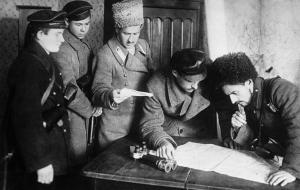
November 7, 1917
The provisional government fails to gather enough troops for a defense against the nightly uprising, which started in the late hours of the 6th. The Junkers are no good, while everyone else has pretty much switched sides. The Bolsheviks also have the Red Guards with them.
The Bolsheviks quietly set about surrounding every government institution and manning every strategic crossing in the capital. Many of the soldiers still protecting the government give up voluntarily. By early morning of the 7th, it becomes clear the provisional government no longer has power.
About two hours before noon of November 7, the MRC issues a public address: "To the citizens of Russia: the provisional government has been deposed..." Institutions, public, government and educational, all cease activity by mid-afternoon. Kerensky is nowhere to be seen. By the evening of the 7th, all government structures are under Bolshevik control.
The last pockets of military resistance loyal to Kerensky were crushed outside Petrograd in the days that followed, and a new government – the Council of People's Commissars, loyal to Lenin, takes power.
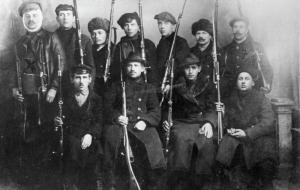
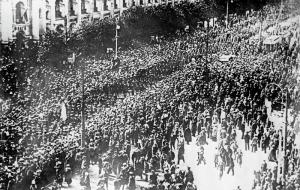
-
1 November
-
2 November
-
3 November
-
7 November